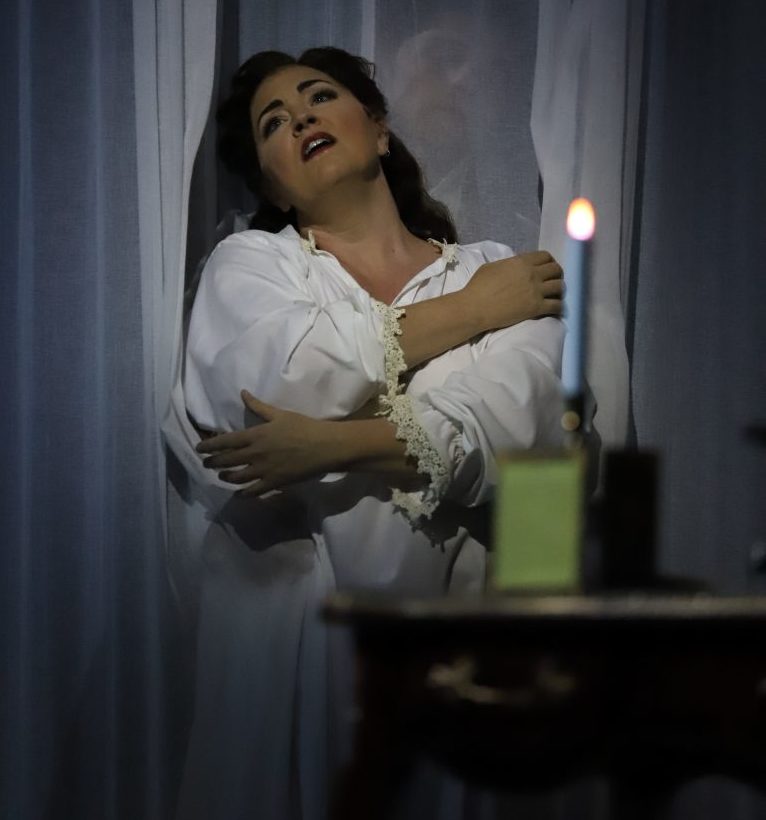For most people, singing loud enough to project to a hall of 2,000 seats without amplification sounds impossible. Imagine doing it for nearly half an hour straight. In Russian.
That was Soprano Melody Moore’s challenge as she began prepping for her character Tatyana’s famous Letter Scene in Tchaikovsky’s Eugene Onegin. When the curtain rises for the opening night of HOT’s upcoming co-production of the opera this Friday, it will be her first time performing the role for a full audience. Preparing for the role was no easy feat, Melody shared.
“When I was first looking it over, I already knew that the Letter Aria was 17 minutes,” she said. “What I didn’t realize was that it’s book-ended with two other scenes. So when it really comes down to it, it’s about 27 minutes of non-repetitive Russian. That meant brand new Russian words for me to learn on every page, for 27 minutes of singing. That’s when I started to sweat.”
Melody has sung plenty of intensely challenging roles on some of the world’s leading opera stages before. She has performed at San Francisco Opera in the title role of Tosca, English National Opera as Mimì in La bohème, Washington National Opera in the title role of Catán’s Florencia en el Amazonas, and more. She has been praised worldwide for her impressive phrasing and control. Opera News reported that she could sing from the “highest forte expression of desire and anger to the lowest pianissimos without any seeming strain.” So it wasn’t her vocal stamina she was concerned about.
Even the Russian language didn’t intimidate her. Despite the fact that it was her first time singing in Russian, she had already been challenged more by learning Czech during for her performance in Leoš Janáček’s Katia Kabanova.
Instead, she was worried about the capability of her mind. Could she memorize and perfect the pronunciation of each Russian word, put it to music, act, and move around the stage all at once and for that long? When she began rehearsing the role, she couldn’t.
“I wasn’t able to really make the scenes stick together at first. At one point it seemed insurmountable.”
Melody’s character of Tatyana, too, begins the opera with a troubled mind and much to learn. As she falls for Onegin, she battles internally about what to do about it. And when she decides to write him a letter, she agonizes over what to say.
To prepare for the emotions she would portray in acting the role, Melody read Pushkin’s novel, which the opera is based on. She then read Tchaikovsky’s lines, paying close attention to the feelings expressed by her character in each.
“I got to the section about her letter, and [the interpretation of Pushkin] is almost word for word. So I understood that Tchaikovsky was really trying to stay pure to what was written,” She said.
She then brought the script to a Russian coach to confirm her interpretation. Melody began to understand who Tatyana was. She thought of her as not only a somewhat serious teenager, but as a dreamer who was hoping for the best in life. In the letter scene, Melody saw that Tatyana embraced her vulnerability and trusted in Onegin’s honor as she began to find the right words to say. Melody decided to take a page from Tatyana’s book.
The more she practiced the Letter Scene, the more Melody’s own words came to her. Soon, she got to the point where she could put down her well-worn script and say every word of the monologue straight through.
“The words finally came,” she said. “It just took a lot of patience, a lot of homework outside of the rehearsal room, and a lot of help from the staff.”
During the last final dress rehearsal of HOT’s Eugene Onegin on April 18, after more than 100 hours of rehearsing, Melody’s readiness was put to the test. And her efforts paid off. In a captivating performance , the letter scene appeared effortless.
Melody attributed her success in part to the pace of Hawaii, which eased her mind, and to the HOT staff’s support and trust in her capability. But most of all, it was Melody’s own determination that pulled her through.
Tatyana isn’t as lucky in the immediate aftermath of her emotional efforts. In the opera, Onegin rejects Tatyana after reading her heartfelt letter. Tatyana ends the First Act hurt and embarrassed.
“But she doesn’t throw herself off a cliff or over a church balcony,” Melody notes. “She just says, ‘Well, this didn’t work out, and that’s okay, and I wish you all the best.’ That’s so rare for a woman in opera. Tatyana knows what she wants. She doesn’t compromise herself, and she makes it out of it all doing well.”
In a way, Melody said, she can relate to Tatyana. She was inspired by the character. The two both faced great mental strain, grappled with the potential for failure, but wound up triumphant.
“I’m ready to perform Tatyana,” Melody said. “Opening Night couldn’t come soon enough!”

